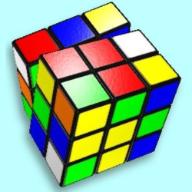# 20 algebra question?
2015-08-29 8:10 pm
I wrote the equation as x^2 + (x+2)^2 = 181 but I don't think that's right because when I solve it doesn't work out.

回答 (5)
2015-08-29 8:33 pm
✔ 最佳答案
x^2+(x+1)^2 = 1812x^2+2x-180 = 0
x^2+x-90 = 0
(x+10)(x-9) = 0
Answer 9 and 10 and
-10 and -9
2015-08-29 9:37 pm
They are consecutive integers, so they go up by 1. You would only use x+2 if they were consecutive *EVEN* integers, or consecutive *ODD* integers.
Even integers go up by 2:
0, 2, 4, 6, 8...
Odd integers go up by 2:
1, 3, 5, 7, 9, ...
But plain integers go up by 1:
0, 1, 2, 3, 4, 5, ...
So you want to use:
x² + (x+1)² = 181
Answers:
9 and 10
or
-10 and -9
Even integers go up by 2:
0, 2, 4, 6, 8...
Odd integers go up by 2:
1, 3, 5, 7, 9, ...
But plain integers go up by 1:
0, 1, 2, 3, 4, 5, ...
So you want to use:
x² + (x+1)² = 181
Answers:
9 and 10
or
-10 and -9
2015-08-29 8:13 pm
... two consecutive integers ...
That would mean x and x+1. You used x+2, which is wrong.
That would mean x and x+1. You used x+2, which is wrong.
2015-08-29 9:52 pm
x^2 + ( x + 2)^2 = 181
x^2 + x^2 + 4x + 4 = 181
2x^2 + 4x + 4 = 181
2x^2 + 4x - 177 = 0
Agreed it doesn't work out by factoring (brackets)!!!
However you can use the Quadratic Eq'n This will give a result !!!!
x = [ - b +/-sqrt [ b^2 - 4ac]] / 2a
Where
a = 2
b = 4
c = -177
Substituting in and 'number crunching'.
x = [ - 4 +/- sqrt4^2 - 4(2)(-177)] ] 2(2)
x = [ - 4 +/- sqrt [ 16 + 1416] ] /4
x = [ - 4 +/- sqrt[ 1432] / 4
x = [ - 4 +/- 37.84... ] / 4
x = -1 +/- 9.46...
x = -10.46...
&
x = -8.46...
Yes !!! You would have great difficulty trying to solve by factoring !!!!
Hope that helps!!!!!
x^2 + x^2 + 4x + 4 = 181
2x^2 + 4x + 4 = 181
2x^2 + 4x - 177 = 0
Agreed it doesn't work out by factoring (brackets)!!!
However you can use the Quadratic Eq'n This will give a result !!!!
x = [ - b +/-sqrt [ b^2 - 4ac]] / 2a
Where
a = 2
b = 4
c = -177
Substituting in and 'number crunching'.
x = [ - 4 +/- sqrt4^2 - 4(2)(-177)] ] 2(2)
x = [ - 4 +/- sqrt [ 16 + 1416] ] /4
x = [ - 4 +/- sqrt[ 1432] / 4
x = [ - 4 +/- 37.84... ] / 4
x = -1 +/- 9.46...
x = -10.46...
&
x = -8.46...
Yes !!! You would have great difficulty trying to solve by factoring !!!!
Hope that helps!!!!!
2015-08-29 8:14 pm
why x and x + 2 for CONSECUTIVE integers ?
收錄日期: 2021-04-21 13:50:20
原文連結 [永久失效]:
https://hk.answers.yahoo.com/question/index?qid=20150829121002AAlffFT



